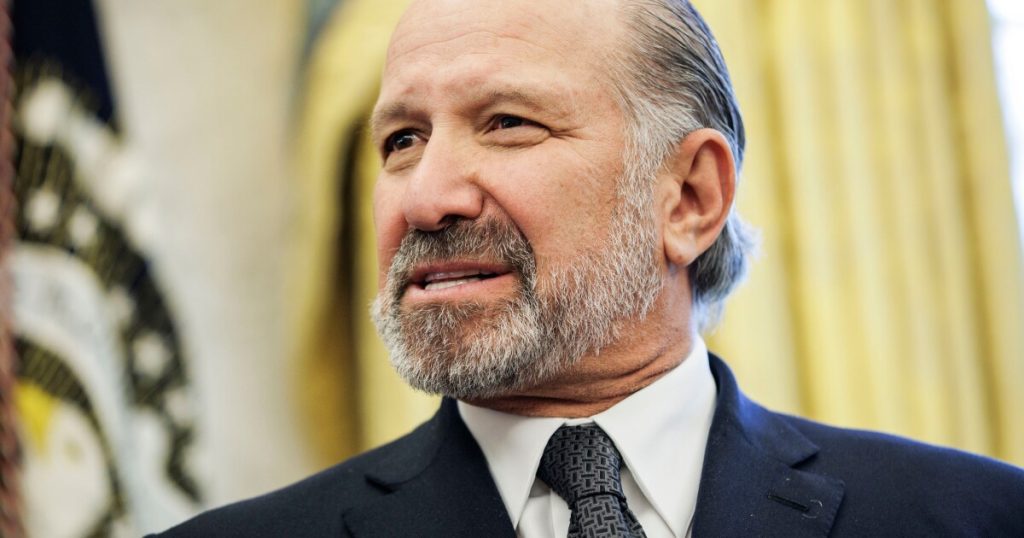“Until I run the game, I’ve got everything to gain,” the hip-hop artist Kxtz once
The 20-something wasn’t kidding. His real name is Kyle Lutnick, son of the Wall Street billionaire who just became U.S. Commerce secretary. Now, Kyle and his younger brother Brandon have been elevated to the top of their father’s sprawling financial empire.
Kyle’s Stanford University roommate gave him his start in music, according to a thank-you on one song that said the friend had already moved into the crypto world: “It’s not as fun as being a rapper, but we all have our vices.”
The two oldest sons of billionaire Howard Lutnick, the former chief executive officer of Cantor Fitzgerald LP, are both still in their 20s but have suddenly found themselves with a level of influence rarely wielded on Wall Street. Insiders expect they will soon take ownership as well as control.
Brandon, 27, is now CEO and chairman, and Kyle, 28, executive vice chairman of the parent company that controls investment bank Cantor Fitzgerald & Co., brokerage BGC Group and commercial real estate firm Newmark Group. And they’ll be key players in the crypto world, thanks to Cantor’s expansive work in the sector and its alliance with Tether Holdings.
Together, the moves inaugurate a new dynasty on Wall Street, where control of investment banks was once regularly passed from generation to generation, though the industry now tends to call itself a meritocracy.
They also cement the Lutnick family’s control over a group with more than 14,000 employees that the secretary has pledged to keep separate during his time in Trump’s cabinet, where key decisions over tariffs and trade could impact the firm’s deals and clients. Those who’ve worked with Lutnick say he trusts few people outside of his family and his closest advisors, including Stephen Merkel, Cantor’s general counsel.
A Cantor spokeswoman declined to comment beyond Tuesday’s
Gaining power early runs in the Lutnick family. Howard was 29 when he was appointed CEO of Cantor Fitzgerald in 1991, making him one of Wall Street’s longest-tenured bosses. Lutnick won control of the firm in 1996, positioning himself as an all-out competitor and feuding for years with the widow of the firm’s founder. In 2001, he was taking Kyle to his first day of kindergarten on the morning when the attacks on the World Trade Center killed 658 colleagues, including the CEO’s brother.
These days, Cantor Fitzgerald, which turns 80 this year, has an unusual position in the landscape of Wall Street. Compared with the biggest banks, it’s small, scrappy and idiosyncratic, often piling into areas where larger rivals have pulled back. While others remained suspicious of the crypto business, Lutnick made Cantor a linchpin of the sector, expanding its coverage team, hosting conferences and holding most of Tether’s U.S. Treasury bonds that back more than $130 billion of its tokens.
The firm’s other big bets include special purpose acquisition companies during the 2021 SPAC boom and hires of top traders from larger firms — with the help of Anshu Jain, the former co-CEO of Deutsche Bank AG who finished his career at Cantor before he died in 2022. Lutnick hired deputies including Pascal Bandelier, a former Barclays PLC trader who now runs Cantor’s equities business, and Christian Wall, a former Credit Suisse trader who runs fixed income.
They arrived at the firm when Sage Kelly was building out the investment-banking business after Lutnick hired him following his departure from Jefferies Financial Group. Kelly has poached bankers from bulge-bracket banks with the promise of transparent pay closely tied to the work they bring in.
The three deputies will run Cantor as co-CEOs. The company is also parting ways with Mark Kaplan, the firm’s longtime chief operating officer, who had been hired while Jain was there, according to a person familiar with the matter.
Brandon, who cuts a much taller figure than his father, has worked with Tether at Cantor, where he’s been an executive since last April. Following his summer analyst stint in 2019 at Newmark, he had a summer internship at private-credit firm Oak Hill Advisors, returned there as a credit analyst for several months and then spent two years in sales and trading at Cantor. Recently, he was named CEO of two of Cantor’s SPACs.
Kyle was an intern on BGC’s foreign-exchange options desk in 2016, an intern at Scooter Braun’s talent agency in 2018 and then became an associate at Newmark. In 2021, he joined Knotel Inc., the company’s flexible-office business, and was promoted to be a global managing director last year.
Kyle’s biography on Spotify calls him a DJ, rapper, singer, director, manager and nightlife figure who blends hip-hop and electronic dance music. He helped develop Old Sessions House, a converted 18th-century London courthouse with jail cells in the basement that Knotel runs as a rival to Soho House & Co.
On social media, the sons have splashed photos of elaborate trips to the Mediterranean and hangouts with other billionaires’ scions, including Matan Adelson, son of Miriam and Sheldon Adelson. Brandon recently posted a photo with his father in front of the Starship rocket of Elon Musk’s aerospace firm Space Exploration Technologies Corp., or SpaceX. The rocket had a test flight in Texas last month.
Both Kyle and Brandon attended Horace Mann School, the elite New York private school that charges about $65,000 a year in tuition and where their father has served as a trustee. A science and collaboration building called Lutnick Hall opened there in 2018.
The sons graduated from Stanford University, where their parents have provided
On LinkedIn, Brandon’s fondness for exclamation points and supportive comments show a personality that matches the enthusiasm of his father. “Hair is fantastic. Amazing person! Congrats my good friend!” he wrote a few years ago. “Amazing!” “Congrats!” and “Let’s go!” he added elsewhere.
And when Kyle nabbed a promotion about a year ago, Brandon left another comment: “The future is now.”

